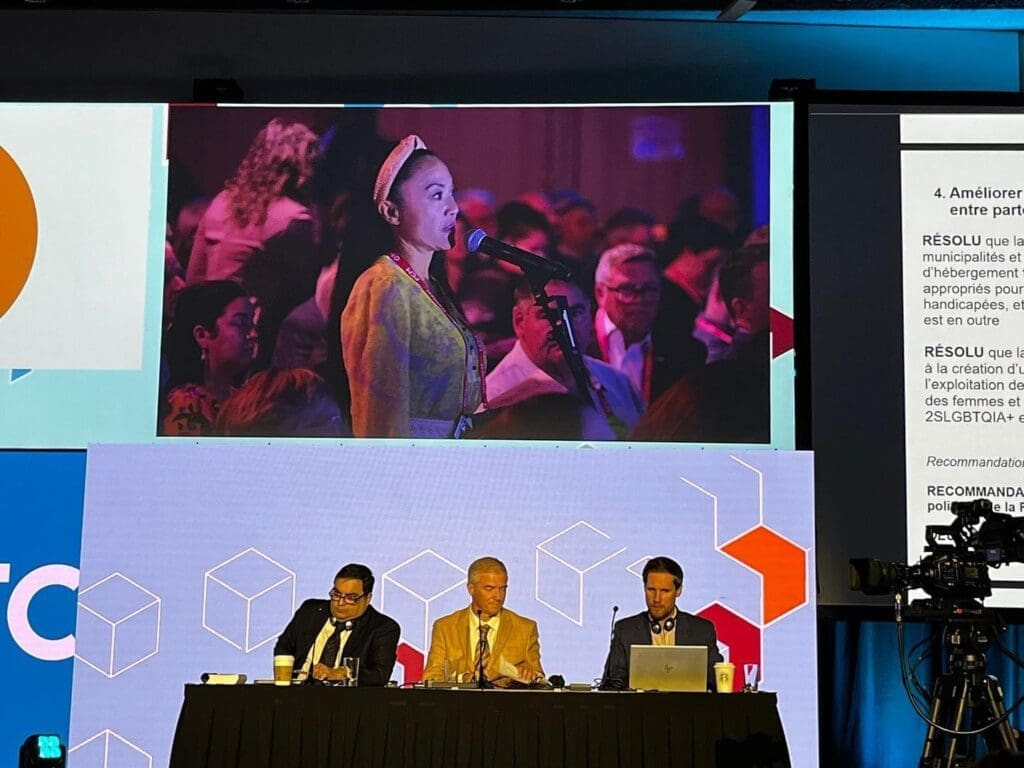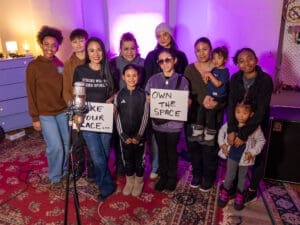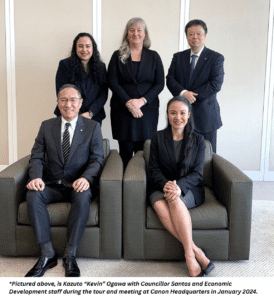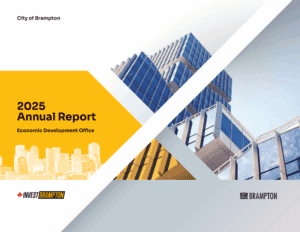At the recent FCM Annual Conference in Calgary, Alberta, discussions focused on our communities’ future from the perspective of municipalities. It is important to understand why these motions were prioritized over others. Councillor Rowena Santos, who worked on these three motions locally in Brampton, at the regional level, and across the country through FCM as a board member, recognized that Brampton and other growing municipalities face similar challenges. To ensure other municipalities can learn from these issues and take preventive measures, Councillor Santos, who has been dedicated to these causes for the past five years since her first election, took the initiative to advocate for the following issues.
“I am honoured to have addressed these critical issues at the FCM Annual Conference, representing Brampton and advocating on a national stage. From addressing harassment against elected officials to promoting shelter support for survivors of violence and tackling food insecurity, these discussions underscore our commitment to building safer, more equitable communities. It is crucial that municipalities learn from these challenges, ensuring proactive measures for a better future across Canada.”– Rowena Santos, Regional Councillor, Wards 1 and 5; City of Brampton
Amid the conference halls, where more than 3,100 delegates gathered, several issues were discussed, including harassment against elected officials. Many officials who have faced such situations themselves joined the discussions, advocating for measures to protect officials and their families from threats and intimidation. The goal was simple yet profound: to safeguard democracy and foster a respectful political environment.
Another important topic was the need for shelter support for women and survivors of intimate partner violence. Some of the stories of resilience and struggle that were presented were heartbreaking to hear. The push for permanent funding to ensure safe havens and long-term support for those in need, including Indigenous, 2SLGBTQIA+ individuals, and people with disabilities, was a key focus.
While these discussions were in progress, another issue on the rise was food insecurity. The federal government was called upon to provide emergency funding to food banks and address the root causes behind food bank usage, such as affordability and inequality. These motions emerged from discussions and shared concerns, reflecting the commitment to building safer, more supportive, and equitable communities. Together, we hope to pave the way for a brighter future for all Canadians.
To know more about the Municipal Growth Framework, click here.
Resolutions in depth
RESOLUTION
WHEREAS, Women, particularly Black and racialized women, are disproportionately targeted by violence and harassment toward elected officials; and
WHEREAS, Increasing the number of elected women, Black and racialized, and 2SLGBTQIA+ representatives in Canada is a priority for local governments and the federal government; and
WHEREAS, Severe abuse, both online and in-person, has the potential to discourage underrepresented groups from joining and remaining engaged in local politics, limiting the diversity of opinion needed in healthy democracies; and
WHEREAS, all elected officials have an ability to show leadership on this issue by modeling behaviour, and should always strive to elevate debate, embrace differences of opinion, disagree respectfully and focus on issues of policy and substance; now therefore be it
RESOLVED, That the federal government, work with provinces, territories, and local governments, including through FCM, to identify and implement measures to protect elected local government officials, their family members, and staff – especially women, members of Black and racialized communities, and 2SLGBTQIA+ individuals, persons with disabilities, and Indigenous people – from harassment, intimidation, and threats, thereby reinforcing a unified front to safeguard democracy; and be it further
RESOLVED, That FCM calls on all elected officials of all orders of government to lead by example, demonstrating civility and mutual respect for their political counterparts.
RESOLUTION
WHEREAS, 78% of victims of police-reported intimate partner violence in 2022 were women and girls, and in 2019 rates were 3.5 times higher among women than men; and
WHEREAS, Intimate partner violence, in 2009, was estimated to cost $7.4 billion annually to the public system, impacting municipal budgets for public safety and housing; and
WHEREAS, Rural, remote, and Northern communities experience disproportionate rates of IPV, with risk of IPV 75% higher for women in rural communities than women in urban communities, and 73% of survivors in rural communities at high risk of being in severe or extreme danger of being killed; and
WHEREAS, Indigenous women are 3 times more likely to experience IPV than non-Indigenous women, and are 8 times more likely to be murdered by intimate partners than non-Indigenous women, because of the intersections between colonialism, racism, and misogyny; and
WHEREAS, IPV is a phenomenon which affects Black and racialized women, women with disabilities, and 2SLGBTQIA+ people disproportionately;
WHEREAS, Women’s shelters nationwide consistently struggle with permanent funding to provide essential transitional, family, and permanent housing solutions for women fleeing IPV, and as COVID-oriented funding expires and piecemeal efforts to fund women’s shelter systems result in women experiencing IPV being continually at risk; and
WHEREAS, The federal government has made gender-based violence (GBV) and IPV priorities across ministries and agencies through the National Strategy to Address Gender-Based Violence and the National Action Plan to End Gender-based Violence, signing bilateral agreements with provinces and territories, but gaps remain; therefore be it
RESOLVED, That FCM calls on the federal government to create a permanent fund, open to local governments and community organizations, for the construction of shelters and transitional housing for women and survivors of intimate partner violence, including housing appropriate for Indigenous, 2SLGBTQIA+ people, and persons with disabilities, with a dedicated rural, remote, and Northern (RRN) stream; and
RESOLVED, That FCM calls on the federal government to work with the provinces and territories to provide permanent operational funding, open to local governments and community organizations, for shelters, transitional housing, and supportive housing for women and survivors of intimate partner violence, including Indigenous, 2SLGBTQIA+ people, and persons with disabilities.
RESOLUTION
WHEREAS, people with fixed incomes, including seniors and social assistance recipients, are at extremely high risk of food insecurity and continue to struggle disproportionately as their dollars are being spread thinner;
WHEREAS, challenges are also continuing to grow for working people, renters, and people living in remote and northern regions of Canada;
WHEREAS, racialized Canadians are disproportionately impacted by each of these factors, as the systemic barriers they face have been further exacerbated by the economic and affordability crisis of the past few years;
WHEREAS, food banks were established as a temporary solution to the increasing cost of food and needs in the community but are now part of a system that government and communities heavily and increasingly rely on;
WHEREAS, it has been a full year since Food Banks Canada sounded the alarms in the HungerCount 2022 report, calling for action to be taken immediately to help the millions of struggling Canadians from coast to coast to coast;
WHEREAS, the latest Food Banks Canada report from March 2023, indicates that nearly 2 million Canadians accessed food banks across the country, a 32 per cent increase from March 2022 and a 78.5 per cent increase from March 2019, which is the highest year-over-year increase in usage ever reported;
WHEREAS, the “Emergency Food Security Fund” was established by the Federal Government to address urgent needs during the pandemic but food insecurity has only worsened, and the Federal Government no longer has a program to provide ongoing support to Food Banks;
WHEREAS, the majority of support received by food banks is through community fundraising and donations but given financial pressures faced by individuals, these donations are declining;
WHEREAS, in certain communities, people who were donating to food banks are now instead accessing the food bank;
WHEREAS, the need to address the food insecurity crisis touches on many of the Federation of Canadian Municipalities (FCM) focus areas, including the Inclusive Communities focus area; therefore be it
RESOLVED, that FCM calls on the Federal Government to help address the food insecurity crisis by providing emergency funding to food banks, food rescue agencies, and farmers markets providing emergency food assistance, and recognize the systemic issues involved in food bank usage, including affordability, inequality, core housing need and insufficient social supports, in order to end food insecurity.
























